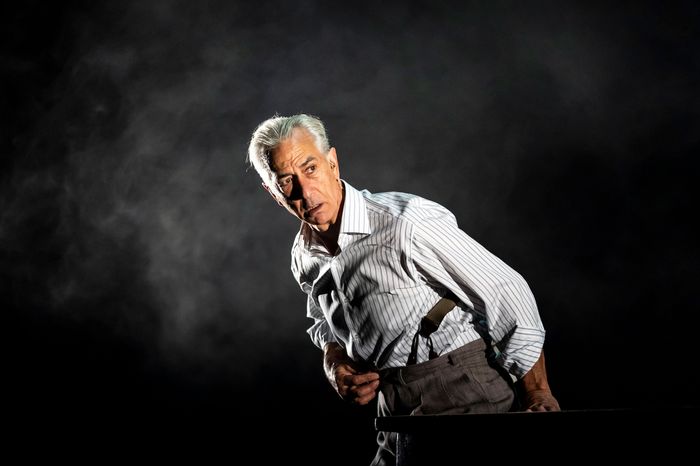
The imperative is right there in the title. Remember This: The Lesson of Jan Karski is in the business of making you take action, though it’s not quite a call to arms. It’s more about the specific, complicated difficulty of paying attention. In the play, memory is an active choice. What does it mean to witness something beyond comprehension? Can you make other people believe it? And how does that remembering change you?
The stage at Brooklyn’s Theatre for a New Audience is set like a lecture hall, with two wooden chairs and a table. David Strathairn enters alone as himself, a folksy, familiar presence you’ve seen before, whether onstage or in numerous “oh, nice to see him here” roles onscreen. He is dressed like a professor, and slips on suspenders and a coat as he introduces the play. Then, with a sudden, convincing shift into a Polish accent, he is a professor, becoming Jan Karski, teaching a class at Georgetown in the later years of his life, unspooling a lecture for his students about what he witnessed during World War II.
Growing up in Poland before the war, the real Karski was a promising student aspiring to a diplomatic career when the Nazi invasion thrust him into joining the Polish underground. Strathairn starts out in the mode of a reminiscing grandfather (he even buttons on a cardigan) and then switches to that of an actor in an adventure serial, at one point jumping off the table as if he were escaping a speeding train. (The actor is a highly agile 73.) The lighting design, by Zach Blane, establishes each shift in setting, and as the story creeps along, it grows darker and darker around Strathairn. A sometimes insistent score by Roc Lee – scattered bits of string melodies, a piano, etc. – underlines the stakes, though Strathairn himself makes them clear enough in his performance alone. As the darkness grows, Karski ventures into events that are increasingly hard for him to remember.
They’re hard for him to recall not on a literal level – one of Karski’s assets to the Underground was his photographic memory – but in terms of a primal revulsion. By 1942, he is asked travel to the Warsaw ghetto and to a Nazi death camp in order to witness the Holocaust and report what he sees to the Allied leaders in order to spur them to action. Here is where the bare stage serves Strathairn best. As Karski, he describes a reality so horrible that it would be impossible to stage and then occasionally steps into the voice of his guide, pointing at each atrocity, telling him, “Remember this.” Lit up amid spools of fog, Strathairn’s eyes are soft and active and overwhelmed all at once in these scenes. It’s a stage performance in close-up. You see it all through those eyes.
What Strathairn-as-Karski describes is now well established in the historical record and already familiar to many. Decades after the war, Karski shared his story in Claude Lanzmann’s Shoah (and this play gets a bit of levity out of his distrust of Lanzmann’s self-importance). But at the time, the Allies initially did not believe him, and so there are scenes of exasperation, of one meeting after another in which he tries to convince people of a truth they would later deny they knew about until later. At one point, one official tells him that he flat-out doesn’t believe the story. He doesn’t think Karski is lying, but he simply can’t bring himself to accept what he’s heard. Not listening, we realize, is the heart of moral failure.
Those tensions — about why people can hear testimony and refuse to engage with it — bring the most heft to Remember This. The play’s director and co-author, Derek Goldman, is the head of Georgetown’s performing-arts department, and co-author Clark Young is a former student of his. The questions at play can indeed feel stiffly professorial at points, and some of Karski’s wisdom takes the form of quotable, generalized aphorisms along the lines of “Governments have no souls; individuals have souls” that interrupt the flow of the story. Jotting down notes as I watched, I found myself underlining a few of those sorts of lines as if I were a student worried they would be on the final.
The play is on surer ground when engaging with Karski on a human scale, and Strathairn is exceptionally able to breathe electricity into it. He figures the man as a bit of a dandy, eager to impress, rueful about his losses, with reserves of fire. You see a clip of Karski in Shoah near the start, getting overcome with emotion during an interview and leaving the room — a moment that is, itself, uncomfortably personal to watch. But then you forget that he and Strathairn are not one and the same until Strathairn drops the accent and returns to narration at the end of the performance. He holds one hand in a coat pocket early on in the play, an act that becomes poignant later on.
Strathairn has been with the play since 2015, and because he is so intent in the convictions of his performance, his own psychology as an actor rises to the surface. His decision to come back to Karski’s remembrances again and again — to wield his talents for the sake of that history — has its own persuasive force. That’s where the imperative comes in again. He is dedicating himself to this. It would behoove you, at least, to lean in and pay attention.
Remember This is at Theatre for a New Audience through October 16.


